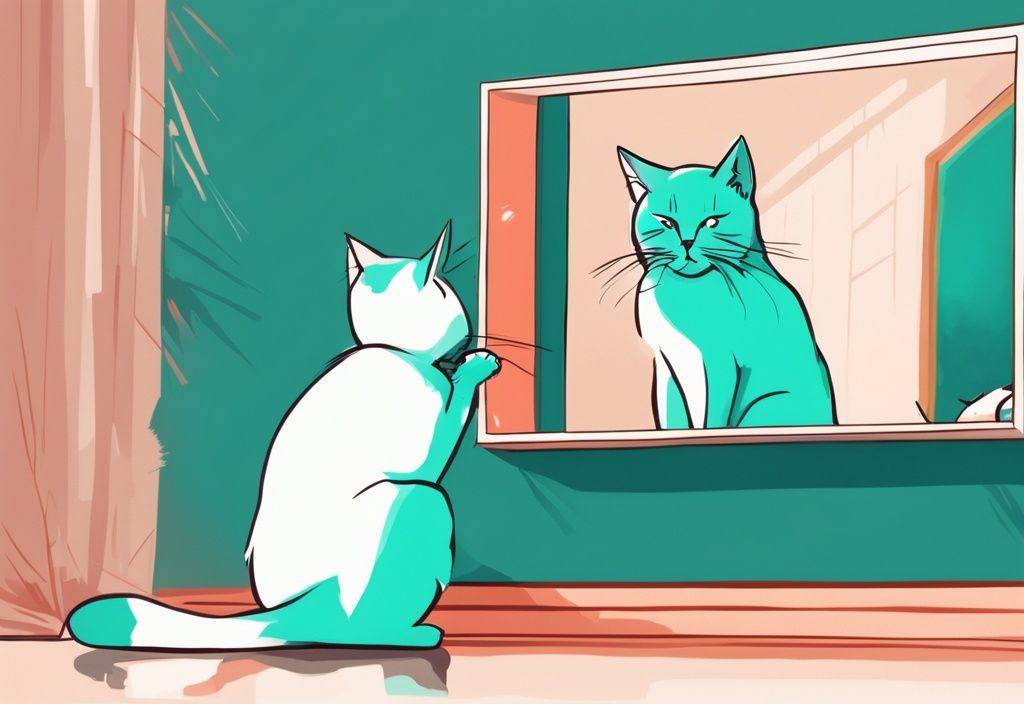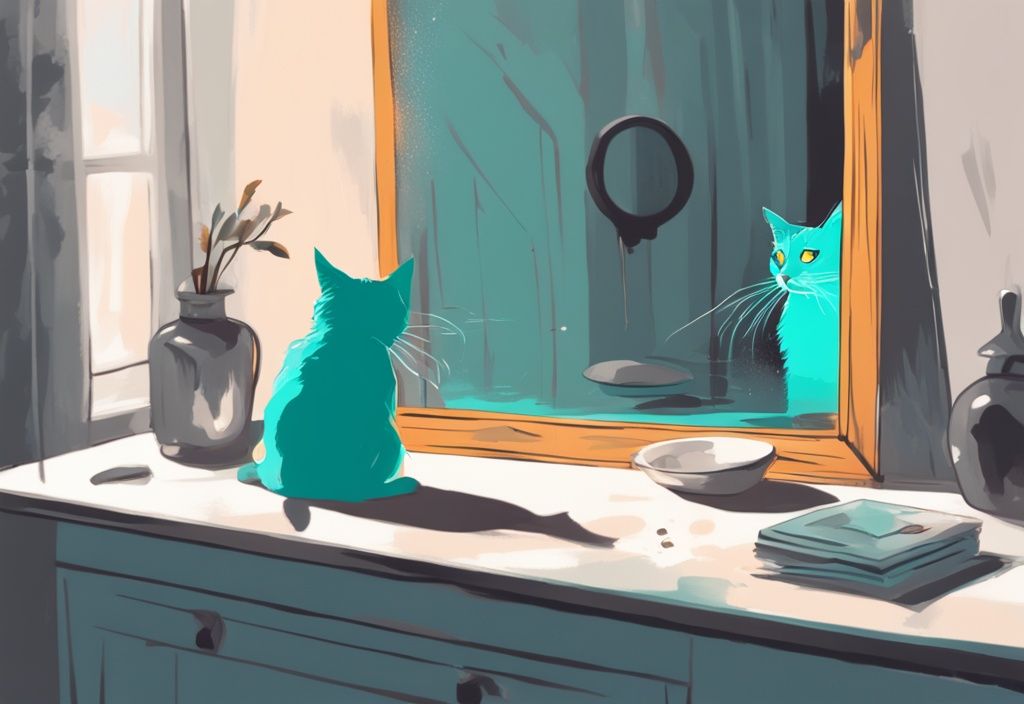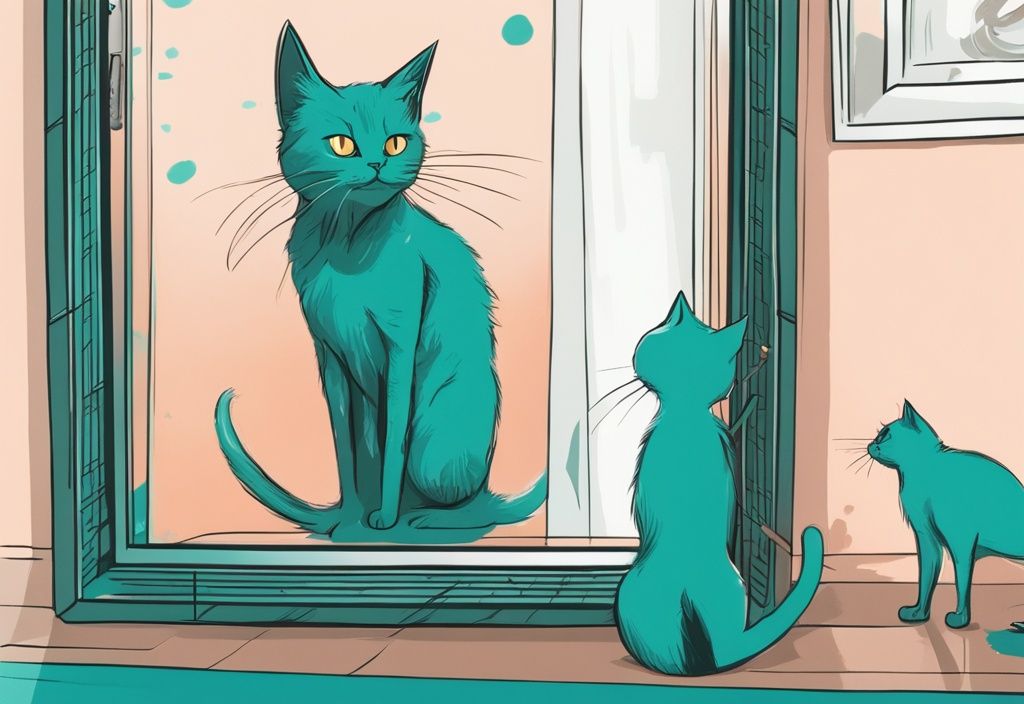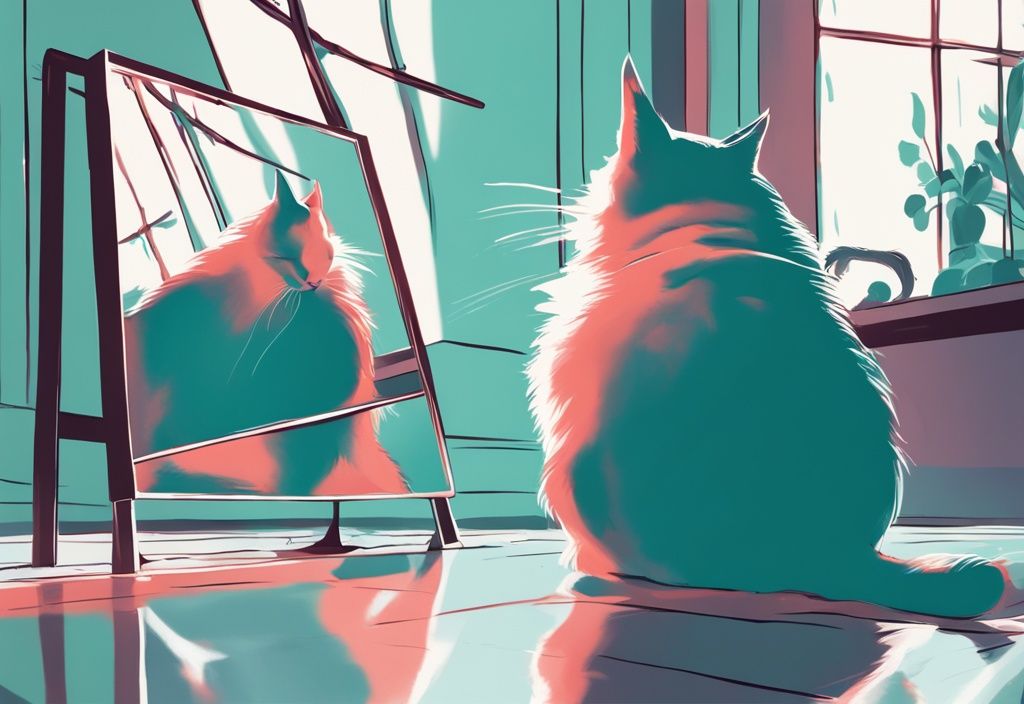Have you ever caught your cat doing its best impression of Edward Scissorhands on your mirror and thought “Why does my cat scratch the mirror so much?” Well, my fellow cat-parents, you’re not alone in this feline puzzler! In fact, it’s a question that has perplexed us for years!
Harnessing a decade of purr-fect pet experiences, we’ve clawed through the mystery and are prepared to let the cat out of the bag. We’ll paw through every intriguing cause, from Whisker’s obsession with the ‘other’ cat in the mirror to her territorial inclinations. And fear not, we’ve also got practical, cat-approved solutions to keep that mirror scratch-free!
So, saddle up for a Simon’s Cat-esque adventure and prepare to unravel the secret behind your cat’s mirror fascination. Together, we’ll foster a happier kitty realm and put a stop to any feline mirror mischief!
Why Does My Cat Scratch The Mirror?
Ever wondered why your cat seems so fascinated by the mirror on your wall? Let’s dive into some intriguing reasons behind this quirky behavior.
Cat’s Curious Nature and Exploration
Cats are naturally inquisitive creatures, always eager to explore the various objects and surfaces around them. When they stumble upon a mirror, its unfamiliar texture and reflective qualities can ignite their curiosity. This often leads to scratching as a form of investigation. Essentially, this tactile method allows them to gauge the texture and understand more about this intriguing object.
The Reflection in the Mirror
Interestingly, cats generally do not recognize themselves in mirrors. Instead, they perceive their reflection as an unknown cat, intruding on their territory. This illusion can elicit a range of responses, including curiosity, playfulness, or even aggression, all depending on how your cat interprets this “new cat” in their space.
Cat Mistaking Reflection for Another Cat: A Look into Feline Behavior
Due to their limited self-recognition abilities, cats often react to their own reflection as though it were another animal. This can lead to a variety of behaviors—from curious investigation to playful antics, or even defensive posturing if they feel threatened. Your kitty might paw at, vocalize, or scratch the mirror in a bid to engage with this perceived “other cat.”
The Role of Territorial Behavior in Mirror Scratching
As territorial animals, cats can become defensive if they believe another cat has encroached on their space. Scratching is one way they mark this territory, using the scent glands in their paws. This behavior is an attempt to assert dominance or to negate the threat posed by the reflection.
The Attention-Seeking and Playful Side of Your Cat
Mirror scratching can sometimes be an act to get your attention. If past experiences have shown your cat that scratching the mirror gets a reaction from you, they may repeat this behavior to seek interaction or playtime. Additionally, the playful side of your feline friend may see the reflection as a potential playmate, triggering them to bat or pounce at the mirror.

How Stress, Boredom, and Confusion can Contribute to Mirror Scratching
Cats experiencing stress or anxiety may display behaviors like mirror scratching as a self-soothing mechanism. Boredom, especially in indoor kitties lacking sufficient stimulation, may also manifest in this behavior.
Sometimes, your cat might mistake the mirror for a window or another passage, leading them to scratch it in an effort to interact.
Preventing Your Cat from Scratching The Mirror
In this section, we’ll dive into tips, tools, and strategies to prevent your furry friend from scratching mirrors.
Simple Tips to Distract Your Cat
Ever wondered why does my cat scratch the mirror? Understanding this can be the key to solving the problem. Redirecting your cat’s attention is a great starting point. Think interactive toys, regular playtime, and scratching posts. These distractions can work wonders in cutting down mirror scratching. Imagine this: you and your cat, engaged in a fun play session, burning off that extra energy. It’s not just fun, it’s a strategy! Desirable behaviors can be encouraged with positive reinforcement, subtly guiding your cat away from those pesky mirrors.
The Role of Scratching Posts and Engaging Toys
Scratching posts aren’t just there to take up space. They cater to your cat’s natural scratching instincts. When Whiskers scratches the post instead of the mirror, both you and your decor are happier! And let’s not forget the magic of engaging toys. Anything that moves or can be chased taps into your cat’s inner hunter, providing both physical and mental stimulation. Make sure to rotate those toys regularly; keeping things interesting prevents boredom and keeps that mirror safe and sound.
Can Covering or Moving Mirrors Help?
If mirror scratching remains an issue, a quick fix can be altering your mirror’s accessibility. Covering the mirrors reduces visibility and lessens the urge to scratch. Relocating mirrors to areas out of reach can also put a full stop to this behavior. Though these are temporary solutions, they offer immediate respite while you tackle the root causes.
Addressing The Root Cause: Underlying Issues
Digging deeper into why does my cat scratch the mirror often reveals underlying issues like stress, anxiety, or insufficient stimulation. Consulting a veterinarian can rule out any medical concerns and even suggest anti-anxiety medications if necessary. Creating a secure, enriching environment helps address these underlying causes head-on. Mental and physical enrichment can work wonders in keeping undesirable behaviors at bay.

Reducing Stress and Ensuring Adequate Stimulation for Your Cat
Stress? Nobody wants that, including our feline friends. A routine, safe, and calm environment can greatly lessen stress. Diverse activities that keep your cat engaged mentally and physically can curb boredom. Think perches, cozy hideaways, and interactive play options. These little additions can make your home a paradise for your cat, reducing behaviors like mirror scratching.
Frequently Asked Questions About Cats and Mirrors
Understanding why your furry friend might be acting the way they do can be a bit of a puzzle. Let’s untangle these curious behaviors one question at a time.
Why is my Cat Afraid of Mirrors?
Ever caught your cat starting at their reflection with wide eyes? That’s likely because they see their reflection as an unfamiliar intruder. Imagine seeing a strange cat suddenly appear in your space! It can be quite startling, triggering fear responses that vary based on each cat’s unique personality and past experiences.
Are there any Risks for My Cat Scratching Mirrors?
Yes, there are indeed some risks. A falling or breaking mirror could potentially cause injury. Plus, all that scratching can wear down your cat’s claws or even hurt their paws. To keep them safe, it’s essential to provide appropriate scratching posts and other tools.
Will Removing Mirrors Solve the Problem Permanently?
While taking away the mirrors might provide a temporary solution, it’s a bit like putting a Band-Aid on the issue. To prevent recurrence, it’s crucial to address the root causes. Ensure your kitty gets plenty of stimulation and lives in a stress-free environment. For pet owners wondering about managing their dog’s behavior, you might find it useful to read about how long to put a dog in time out to effectively manage time-outs and maintain a harmonious home. Sometimes, professional guidance may be needed to tackle behavioral issues fully.
Which Toys Can Help Reduce Mirror Scratching?
Interactive toys are your best friends here! Laser pointers, feather wands, and moving toys can effectively engage your cat. Puzzle toys that dispense treats can provide much-needed mental stimulation. Don’t forget to rotate the toys regularly to keep things exciting for your curious feline.
Signs That Your Cat Is Scratching Due to Anxiety
If anxiety is at play, you might notice other signs alongside the mirror scratching. Keep an eye out for increased vocalization, restlessness, and excessive grooming. Changes in appetite, hiding, unusual aggression, or clinginess are also red flags. Monitoring these behaviors and consulting with a veterinarian can be essential steps for your cat’s well-being.

Conclusion
Have you ever caught your cat in the act of scratching a mirror and wondered “why does my cat scratch the mirror?” It’s a quirky behavior rooted deeply in their natural instincts and behavior patterns. Cats, being the curious and territorial creatures they are, often find their reflection to be either a fascinating or a threatening sight. Understanding their behavior can be enhanced by exploring resources that delve into cat behavior and body language, such as this comprehensive guide from Tuft + Paw: the definitive guide to cat behavior and body language. They might scratch the mirror in a bid to interact with or assert dominance over what they perceive as another cat.
But let’s dive deeper. This puzzling behavior could also be a playful gesture or an attention-seeking act. If your cat has learned that scratching the mirror grabs your attention, they might repeat it just for the fun response they get from you. Interestingly enough, boredom, stress, and confusion are other big players in this mirror-scratching game. If you’re noticing unusual behaviors in other pets, such as when your dog seems wobbly and off balance suddenly, it might be time to investigate further. Indoor cats, especially, might find novel ways to burn off that pent-up energy, and a mirror can quickly become their unsuspecting target.
So, what’s a loving cat parent to do? Simple distraction methods can work wonders. Think engaging toys that pique your cat’s interest or providing a robust scratching post to redirect that energy. Covering or repositioning mirrors could also remove the trigger entirely. More importantly, fostering a stimulating environment is key. Ensure your cat has plenty of mental and physical activities to keep them entertained and stress-free. Don’t hesitate to consult with your vet if the behavior persists, as there could be underlying issues at play.
After all, understanding and empathizing with your feline friend’s behavior can lead to a more harmonious living situation, making the journey together truly pawsome. Just like how I sometimes need to channel my Border Collie Max’s endless energy into a game of fetch or give my rescue cat Whiskers extra cuddles to alleviate her anxiety, finding the right balance and solutions for your cat will lead to a happier, healthier household for everyone.
